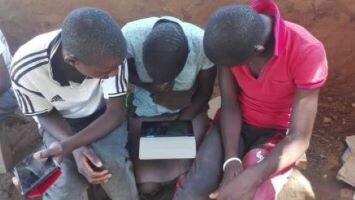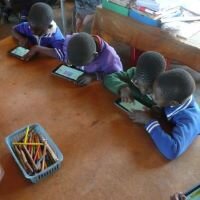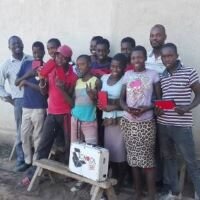Digital school in Zimbabwe
Based on our experience in Burkina Faso and after having contributed to setting up basic training from kindergarten to the end of compulsory schooling (with the bac curriculum as an option), we initiated a second project in 2018, this time in Zimbabwe, to help accelerate access to basic education: The EAGLE Project (eaglelearning.eduaction).
Challenges of education in Africa
Africa currently has a population of 1.2 billion, which is expected to more than double to 2.5 billion by 2050. Not surprisingly, more than 50% of this population are children and young people - Africa is in fact the youngest continent in the world! Unfortunately, in education, it ranks at the bottom of the scale on many indicators. With population growth, the problem of education becomes exponential.
In Zimbabwe, 4.7 million are school-age children (3-16 years old) out of a total population of 13 million (last census figure, 2012). 26%, or 1.2 million, are out-of-school children and more than 750,000 children are at high risk of dropping out of school. Of the 3.5 million students, between 2006-2016, 42% passed their primary school leaving exams and only 19.7% graduated from secondary school. The failure rates are therefore enormous. The study of the causes of these high failure and drop-out rates is linked to two main problems that have also been observed throughout sub-Saharan Africa: the cost of education is too high and 20th century mass education models offer poor quality to learners. This is what desperately hinders development in Zimbabwe, as it is also the case in most African countries.
Digital school project
In order to address the problems of education and school adaptation to the 21st century, the EAGLE (Enhande Access to Great Learning Experiences) project was created to simultaneously address the high costs and insufficient quality of education through the use of ICT technologies. The main idea is to catalyse access to relevant, affordable, accessible and accountable (in the sense of monitoring the goals) education, especially for children from low-income households, in order to unlock Africa's productive and creative potential. The initiative targets vulnerable communities, particularly children who have dropped out of school due to lack of resources or who have never been to school, due to lack of local school buildings, especially in rural areas. The content developed by EAGLE will even benefit children in formal schools because it is engaging, practically relevant and linked to Zimbabwe's national curriculum and school-leaving examinations. Initially, the project will reach hundreds of children in 2019, before reaching many more in the following years.
Team
The project is being implemented by the Zimbabwean Eagle Learning Trust and the Swiss Association Guinkouma. Project management is provided by a dedicated local team of teachers and IT specialists. The extended team consists of teachers and pedagogues, entrepreneurs, computer scientists and technicians.
Link: eaglelearning.education





